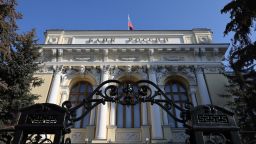Russia is barreling toward a default on its foreign debt payments, threatening to plunge its economy deeper into crisis.
Defaults are murky territory in global economics, and Russia’s situation is complicated by its growing isolation under the unprecedented sanctions imposed on it by Western powers.
For those of us who slept through their Intro to Macroeconomics class in college, let’s unpack just what we mean when talk about this historic (and still potential) Russian default.
First thing’s first: What is ‘default’?
Put simply: Governments, just like regular people, take out loans to finance big projects, and those loans must be repaid on a schedule. A default happens when a borrower cannot pay the interest or principal on its debt when it comes due.
Governments borrow money by issuing bonds. Investors, both at home and abroad, buy those bonds, effectively lending the government money with the promise of being paid back with interest.
Failure to pay results in a default, and that can have dire consequences, which is why governments typically do everything they can to avoid them. Russia hasn’t defaulted on foreign debt obligations since its 1917 Bolshevik revolution.
Why can’t Russia pay its bills?
To be sure, Russia has the money. It just can’t access a bunch of it.
Since 2014, the last time the West sanctioned Russia over its annexation of Crimea, the Kremlin has built up about $640 billion in foreign reserves. About half of those funds are now frozen under Western sanctions imposed after the invasion of Ukraine.
As a result, Moscow has said it plans to pay creditors from “countries that are unfriendly” in rubles rather than dollars or euros until sanctions are lifted, Russian finance minister Anton Siluanov said earlier this week.
But the non-governmental agencies that determine creditworthiness are likely to consider such payments cause for default. Since Russia’s invasion of Ukraine last month, all three major ratings companies — Fitch, S&P and Moody’s — have downgraded Russian debt from investment grade to what’s known as junk (which is exactly as bad as it sounds).
What happened with Russia’s first debt payment?
On Wednesday, a $117 million bill came due. That represents the total interest payment it owes on two US dollar-denominated bonds.
It wasn’t clear whether a payment had been made, although the US Treasury said it would allow the transaction to go through.
For example: We won’t even know whether Russia has made any payments until investors confirm they’ve received the funds. Russia’s finance minister said Wednesday that Moscow had paid its bill, and that it was up to American officials to decide whether it was accepted. (Previously, the finance minister had said the payment would be made in rubles rather than dollars, which would violate the terms of the repayment and trigger a default anyway.)
Investors who spoke anonymously to Reuters and The Wall Street Journal on Wednesday said they hadn’t yet seen the funds arrive.
“The thing about defaults is that they are never clear-cut, and this is no exception,” Guido Chamorro, an emerging market portfolio manager, told Reuters.
Also muddying the situation: There’s a 30-day grace period on the two bonds, which means Russia wouldn’t technically default for another month. A lot can happen in that time.
What happens if Russia defaults?
“A default is a disaster for Russia,” said Timothy Ash, a senior sovereign strategist at BlueBay Asset Management.
The country’s assault on Ukraine has left it with few friends in the international community, and a default would likely cut off access to foreign financing for years.
Russia’s economy is already hemorrhaging. Since the war started, its currency has fallen to record lows, critical revenue is slowing as oil traders shun Russian crude, dozens of international corporations have suspended operations, and sanctions have frozen more than $300 billion in foreign currency reserves.
The pain of a default will be felt largely within Russia.
The International Monetary Fund’s managing director, Kristalina Georgieva, said a financial crisis beyond Russian borders was unlikely to develop “for now,” saying that the exposure of Western banks was “not systemically relevant.”
For anyone having flashbacks of the 2010s European sovereign debt crisis, now is a good time to take a deep breath. Systemic risk appears to be low.
But a default would also come at a time of great uncertainty in global markets. Analysts at Capital Economics warned that if a financial institution is particularly exposed to Russian debt, that could spark broader contagion. That means we won’t really know how bad that is until it happens.
— CNN Business’ Julia Horowitz and Charles Riley contributed reporting.

























